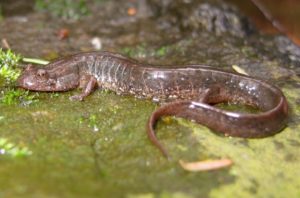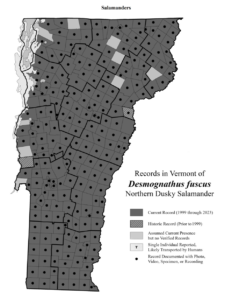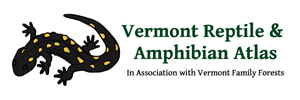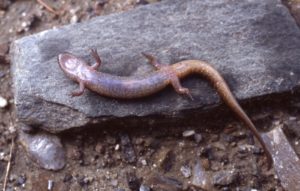Desmognathus fuscus
Identification
The Northern Dusky Salamander is a grayish-brown salamander that is noticeably chunkier than the Northern Two-lined Salamander that they often share their habitat with. Adults range from 3 – 5½ inches long. On young individuals, white lines outlined in black start at the eye and angle down to their jaw. These lines fade as the salamanders age. Their back legs are larger and stronger then their front legs, and their tail is partially keeled.
They lay their eggs primarily under moss over seeps, and the females remain with the eggs until they hatch.
Get more detailed identification and life history information by downloading the chart here.
You can learn more about this species and see some video footage by checking out this clip from our Rattlers, Peepers & Snappers DVD or our video on stream salamanders in the Green Mountains.
Range/Habitat

[ click image to zoom | download printable PDF ]

[ click image to zoom | download printable PDF ]
The Northern Dusky Salamander is found in saturated soil near streams or in seepages in forested areas. They prefer mossy areas and are found in muckier soils (rather than rocks or gravel) than Northern Two-lined Salamanders. They do not travel very far from their streams and seeps.
Northern Dusky Salamanders are found statewide, but less often in the Northeast Kingdom.
Status
The Northern Dusky Salamander has a state natural heritage rank of S5 (common). It is locally common in good habitat. Please report sightings of this species in Vermont if you have not reported them within the last five years from a given location. Any natural history observations (feeding, migrations, road crossing areas, early or late season appearance, abnormalities, etc.) are appreciated. Photographs are always helpful, particularly if your report is the first report of this species from a town.
Additional Photos
More Info
- Desmognathus fuscus at Animal Diversity website
- Desmognathus fuscus at Amphibiaweb
- Desmognathus fuscus at the Canadian Herpetological Society website
- Desmognathus fuscus at the Yale Peabody Museum of Natural History website
Species summary written by Ariel K. McK. Burgess.






